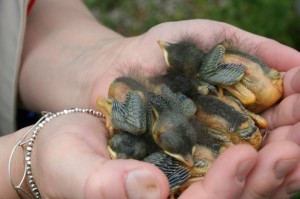Compassion for Creation

A handful of baby bluebirds await a nest change along a “bluebird trail” — an effort by landowners to help these vulnerable birds recover from decades of devastation caused by over-development, industrial agriculture, and pesticide use. Photo: Sara Stratton, 2012.
Last week we focused on the topic of human rights and explored Isaiah’s vision of the shoot from the stump of Jesse that will restore justice. This scripture is also connected to this week’s focus on environmental justice. With “righteousness he shall judge the poor, and decide with equity for the meek of the earth” (Is 11,4). But adjectives like moderate, humble or meek do not accurately characterize our relationship with the earth.
Instead, we are confronted with news about natural disasters influenced by climate change while international conferences that try to reach agreement on minimalistic environmental guidelines and emission targets fail again and again. When we think about the way we mutilate creation and produce massive amounts of pollution, it is easy to become bitter and pessimistic. But people experience transformative moments while enjoying the beauty of nature; the prophet Isaiah uses overwhelming pictures to describe the hope for the reconciliation of all creation with the divine creator. The desert, which seems devoid of life, shall blossom abundantly and rejoice with joy and singing. The place of silence and solitude starts to sing and rejoice and becomes alive. Obviously it is a vision of salvation – life overcomes death. The prophet envisions God’s healing coming with great might.
Isaiah also describes the Way of Holiness and invokes the path of righteousness, a path on which only the redeemed shall walk. This metaphor of course has an intended message for the reader or listener: Isaiah urges us towards right relationship with the rest of creation. This is connected to the creation mandate in Genesis 1:28. But how do we understand the command to “subdue the earth” and to “have dominion over […] every living thing that moves on the earth” in a just way?
Paragraph 7 of the United Nations Universal Declaration of Human Rights (plain language version) states that “the law is the same for everyone; it should be applied in the same way to all.” Justice and equality are connected. If we want a more just relationship with our planet and all life within it, we need more equality and respect. Humankind is one part of creation. Do we look upon nature as something that deserves justice and equality?
In 1972, the Club of Rome issued a report called Limits to Growth, which concluded that the limited availability of natural resources means that economic growth cannot continue indefinitely. But today’s global economies are structured for growth. Companies race against each other in a constant need to increase profits. But what if our understanding of growth was rooted in the will to strengthen our sense of compassion for the vulnerability of all creation? What if we envisioned growing together instead of growing at the expense of others?
If we really want to change our exploitative ways of dealing with creation we have to think globally but act locally. Sensitivity, compassion, love and the will to change ourselves and our behavior as consumers are required if we want to live together and take responsibility as once was asked of Adam and Eve in a garden.
Creator, we are amazed by your creativity; a creativity that is reflected in the diversity of nature, in the diversity of humankind. We want to be aware of our dependency on our environment; let us be sensitive to its vulnerability. Help us to respect nature and sustain life. We must realize that we are often careless, excessive and exploitative in our relationship with creation. Open our hearts; let us envision and practice possible ways of reconciliation with our planet.
Amen.
Pepe Elwert is a graduate student in protestant theology in Hamburg, Germany. He has studied and worked in Nigeria, Ghana, Cameroon, Israel and Palestine, and is currently completing an internship in Canada that included contributing to the work of KAIROS.








